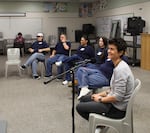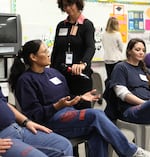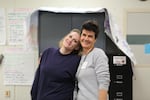“Everything we need to thrive already exists within us.”
That's what Anna Debenham says. She says it in the course of her work, in everyday conversations, in classes that she teaches with her organization, The Insight Alliance — and earlier this year in a Tedx talk. But if you read that and feel a little skeptical, she understands. Now imagine saying that to room full of people who are literally in prison.

The Insight Alliance founder Anna Debenham and several inmates talk at the Coffee Creek Correctional Facility during a "Think Out Loud" taping.
Allison Frost / OPB
That's what she does every week. Coffee Creek Correctional Facility is the state's only women's prison, and it's the the latest Oregon Corrections facility to offer her classes. She also teaches in the MacLaren Youth Correctional Facility and Columbia River Correctional Institution.
We wanted to understand more about the program, how women in prison were using her techniques, and more specifically, how their lives had actually changed. So we went down to Coffee Creek Correctional Facility one early morning this fall with Debenham. She and 12 of her students and former students gathered in one of the prison's classrooms to tell us their stories.
Monster On The Window Sill
Debenham told us she'd spent a lifetime caught in negative thoughts and destructive behavior, including a decades-long struggle with bulimia.
"Growing up, I kind of had created a prison in my own mind," she said.
She tried a long list of things to fix herself, from yoga, positive affirmations and meditation to drugs and alcohol. She felt broken. Nothing worked until she was introduced to perspectives at the One Thought Institute. It wasn't magic, but it was transformative.

Coffee Creek Correctional Institution in Wilsonville is Oregon's only women's prison.
Allison Frost / OPB
"What made a difference was understanding — understanding how my mind actually works," she said.
She said she was able to move beyond her past and see her daily thoughts as what they were: just thoughts, not mandates. She now believes in what she calls innate well-being and tapping into that well-being to make choices moment by moment.
She told the story of an experience she had one night when she was babysitting her young niece many years ago. Her niece was frightened and crying in her bedroom because she thought she'd seen a monster.
"I couldn't see the monster. And she pointed it out, and was like, 'There on the wall!' ... And I could see the teddy bear on her window sill and the moon shining through the window. So I could see that the reflection of the moon is creating this monster on the wall. And it was real. It looked really real to her."
Debenham didn't discount the impact the imagined monster had on her niece. But she addressed the girl's fear by describing to her what was actually going on.
"When we take the teddy bear away, you know, the monster disappears. It's [just] the moon that's reflecting light onto the wall."
Debenham said a similar process happens when adults see that they've created their own monsters — just as insubstantial but also just as real — as the monster made from moonlight and shadow on her niece's bedroom wall.
She tells these and other stories in the classes she teaches to inmates at at Coffee Creek and in other correctional facilities. And they get it.
The impact is important, not only just for themselves, but also because of all the lives they touch both inside and outside the prison — and for all the lives they will touch when they are released which almost all inmates will be.
On Storm Clouds And Being OK
(Editor's note: We are not using inmates' full names to protect the privacy of their victims.)
Lisa, like the other inmates in the class, said she found freedom in recognizing the temporary nature of her own thoughts.

Lisa is an inmate at Coffee Creek Correctional Facility in Oregon who says the concepts she's learned in this program has affected the way she interacts with other inmates and changed her life.
Tess Novotny / OPB
"They're like a storm cloud or weather pattern that will pass through," she said. "So, you know, if you just hang on, it's going to pass, and then something new will come along."
Lisa said it sounds simple, but it has completely changed her life.
"If I'm having a negative thought, I can feed off that negativity and, it can manifest into another negative thought, and another negative thought until chaos is in my brain," she said. "Or I can choose to be like, 'It's just the thought. It will pass and a new thought will come along.'"
For Millard, her initial battle after she was incarcerated was was with guilt.
"I used to cry myself to sleep every single night for why I'm here," she said. "I didn't know how to forgive myself. I didn't know if my victim would be able to forgive me."
Millard said her husband is also serving time at the Oregon State Penitentiary. She has shared the concepts with him as best she could, trying to replicate Debenham's diagrams and lessons from her notes and memory.
"One of the first things that Anna ever told me was, 'You did the best that you could at the time with what you had.' And now I know that I can't change the past, but having this insight, I can change the future. ... I can teach my children, I can teach my family."
Millard said she hasn't gotten rid of the guilt, of course.
"I still have that shame and that still flares up, [but] I can live with it now and know that I'll be better," she said. "It's going to be OK."
She said for her, being "OK" means being conscious of the fact that she's breathing; that she's still here.
"If I have a bad day, I know that it's just the thoughts ... clouding my perspective. And once those thoughts pass, I'm back to where I was, and that's alive. That's breathing. It's having the best relationships I can with my family and friends while I'm in here."
Tapping Into Potential
"I was as coo-coo-ca-choo broken as they come," Jessica said. "[Anna] hates it when I say that."
Jessica is a graduate of sorts of The Insight Alliance program; it is only available to medium security inmates at Coffee Creek, and she has since moved to minimum security.

Jessica (left) and Anna Debenham inside one of the classrooms at Coffee Creek Correctional Institution, the state's only women's prison, where The Insight Alliance classes take place.
Allison Frost / OPB
Jessica said her parents were addicts, and she ended up being "raised by the state," growing up in foster care and experiencing a variety of sorts of childhood trauma. She said she developed a sense of self that only felt seen when she was acting out and getting in trouble. She used meth for decades, went through five husbands and lost custody of two children.
"I have something called dissociative disorder. ... When things get really bad, I go up into a bubble right here and something else takes over," she said.
Jessica said she signed up for The Insight Alliance classes because she heard participants would get cinnamon rolls. No one was more surprised than Jessica herself with the results she experienced, which she said are hard to adequately describe.
"What this program has done for me is — I haven't disassociated in 10 months," Jessica said. I haven't gone up in that bubble. I'm present in life for the first time. I am getting my GED. I'm one test away. I found out, apparently I'm really smart. I can draw; I can write."
Jessica said now, at 40, after being exposed to these concepts, she has just started to tap into her potential.
"I don't know who the hell I am, but I'm falling in love with myself, and it's so awesome," she said.
The Insight Alliance is working with Pacific University to do a quantitative study of outcomes for inmates who go through the program. The results of that study will likely inform size and scope of future prison programs, and could be used to bring more more programs to inmates.
Contact "Think Out Loud"
If you’d like to comment on any of the topics in this show, or suggest a topic of your own, please get in touch with us on Facebook or Twitter, send an email to thinkoutloud@opb.org, or you can leave a voicemail for us at 503-293-1983. The call-in phone number during the noon hour is 888-665-5865.
